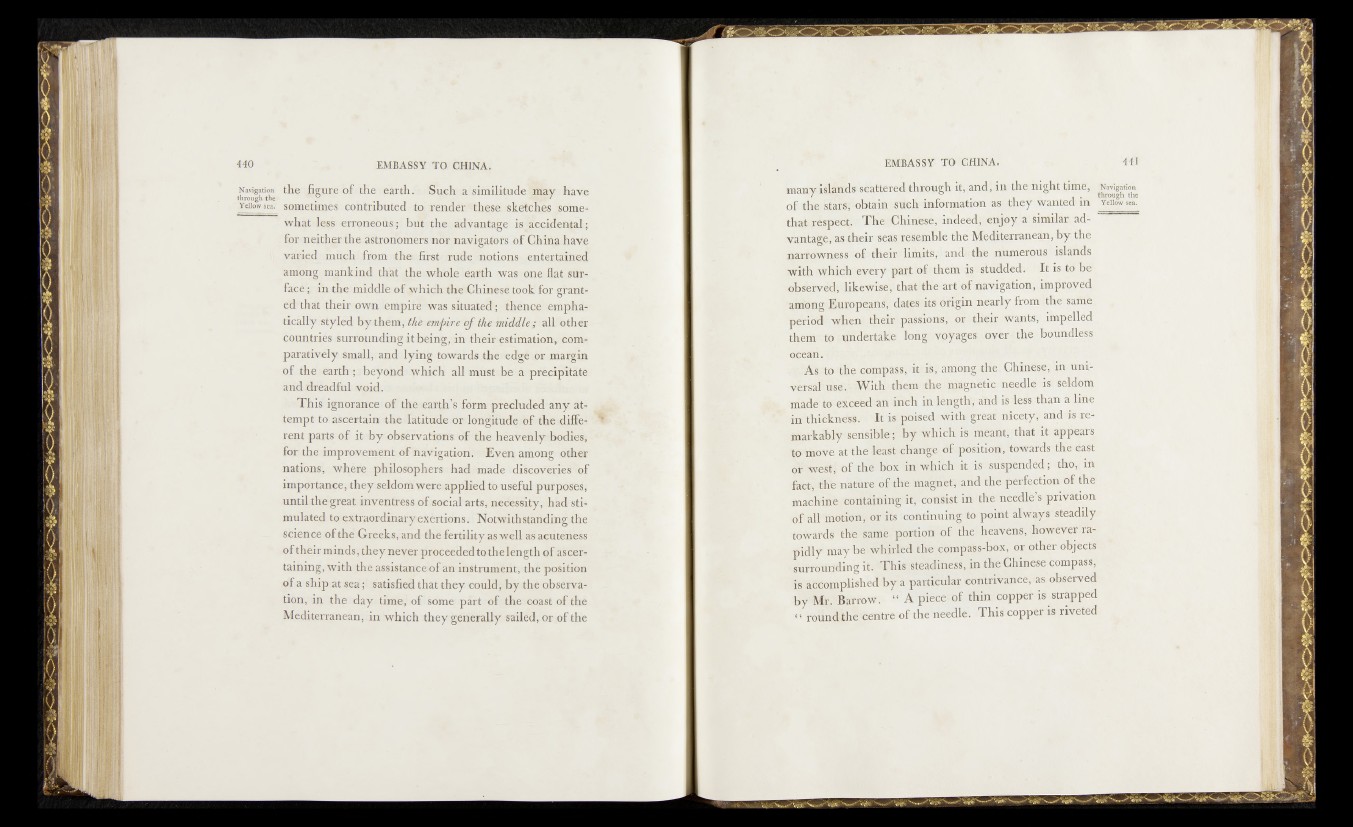
the jigure of the earth. Such a similit:ude|ihay have
sometimes contributed. to. render »these sketch.es somewhat
less erroneous.; but the; advantage is^aceidental ;
for neither the astronomers nor navigators of China have
varied much from the; first rude notions entertained
among mankind that the whole earth was one flat surfaced
in themiddlfe:@f jwhich the Chinese took! for grant*
ed'thstt their own ^empire was situated; thence emphatically
fstyled by tbém; the empire of the Middle ; all' other
countries.surrounding it being, in thoir estimation, comparatively
small, and lying towards thoeedge-or margin
of the earthbeyond which all must be a^precipatite
andJÉËéadful void.
This ignorance of the .earth's form precluded any; attempt
to ascertain- the latitude on longitudf-hf the different
parts of ife hyf ohÉivatious of thé héavenlydfediesr
for the improvement of navigation. ‘Even among either
nations, where philosophers had made discoveries of
importance, theyseldom were/applied to useful purposes,
until thegreat inventress of social arts, necessity, had sth
mulated tnextraordinaryexertions. Notwithstanding.the
scienee of the Greeks, and the fertility as well aS acuteness
of their minds , they never proceeded to the length
taining, with the assistance o f an instrument, thé position
of a ship at sea; satisfied that they couldyby the observation,
in th e day time, of some part of the coast of the
Mediterranean, in which they generally sailed, or of the
many islands» scattered through it, and, in the night time,.
of the stars;iofetain such information as they wanted in ffliyW
that*respect. The/Chiit;sje,:'-indeed^ enjoy a similar*, advantage,
as-their seas resemble the Mediterranean,-by; the
narrowness '»oft their* limits,d'and® the numerous islands
with which’eyery part of'themois studded. It is tefbe
-observed, likewise*: that the art of navigation, improved
among Europeansv daterits>f4 &ih®early from 5the sani'e,
period Wll-en^ their-passions; ^.^their .yfaftts, impelled'
them'4tb s undertake' long. vp^age&yoyery the „ |
ocean.
' ,'A'S-to the compass, it^isy among the ’Cbiri&seyiih uni-
ytfersatuso'.tiWith them.1 the m^n^t-ic'.noedle'asbseMoin
made1' to e^fefebban inch in len£tl#a1adf is tfofk 'than kfilife
f indthickneVs.'- It is {poised with great nicetyy and '
markably1 sertSrMtef-by which is mfe'ant, that it appears
to'move at the -leastlchange- (ff »positipnjtbwafd^ the east
or^WeSfl of the boxdniwhiGfodt;is5Su|pend'ed; itho'fin
faCtylhfe nature of theJfflaghetl'ahd fhe®rfc|tio'nj^Th^
ma&fejfe containing it, consist in th&heedle’s privation
-OPM! motion; of its dontinui'hffo- point al ways.steadil^ ■
tdWifdl the ‘ s^Wdypostion\6£»fhaldioaYens,-hoiwevef.rapidly
may be* whirled* ffedompass-box, or other objects
surrounding it. 'This steadiness; in theCMhese compass,
is acComplishedbyk particular contrivffic^iasfobserved
-by Mr. Barrow. “ A pie&lfof thin 'copper is .strapped
« roundihe 'centre of the’needle. This copper is riveted